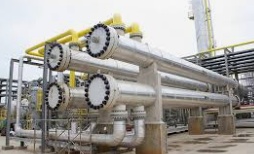Business News of Wednesday, 2 April 2025
Source: www.ghanawebbers.com
Additional gas processing plant: An infrastructural intervention for the energy sector

This article discusses the need for more gas processing facilities in Ghana. It highlights how these facilities can help the country utilize its natural gas resources effectively.
**Gas Availability in Ghana**
Ghana has significant natural gas reserves. Offshore basins are producing increasing amounts of gas. The Western Region is the center of this production. The Atuabo Gas Processing Plant processes and distributes gas for power generation.
Despite progress, demand for processed gas is rising. More investment in processing infrastructure is necessary. A new plant will help maximize Ghana's gas resources, improving energy efficiency and economic growth.
Ghana's total natural gas reserves exceed 2 trillion cubic feet (TCF). Production has been steadily increasing, but much remains underutilized due to processing limits. The Atuabo Gas Processing Plant, operational since 2015, can process about 150 million standard cubic feet per day (MMSCFD). This capacity helps reduce reliance on crude oil but is not enough for growing energy needs.
**Need for Additional Facilities**
Ghana aims to become a regional energy hub. A new processing plant will expand infrastructure and increase output. This will also reduce waste and meet rising demands from neighboring countries like Côte d'Ivoire, Togo, and Burkina Faso.
**Benefits of Gas Processing**
Building another gas processing plant will bring many benefits:
1. **Enhanced Energy Security**
- Increased production and distribution of natural gas.
- Reduced dependence on imported fuels like diesel.
- Stabilized energy costs and a reliable power supply.
- Support for industrialization and attract investors.
2. **Economic Growth and Job Creation**
- New jobs in construction, operations, and maintenance.
- Local businesses will benefit from increased demand.
- Cheaper energy supports industries like manufacturing and agriculture.
- Improved productivity leads to economic growth.
3. **Environmental Benefits**
- Reduces greenhouse gas emissions by minimizing flaring.
- Natural gas emits fewer pollutants than coal or oil.
- Expanding capacity improves air quality and public health.
4. **Regional Energy Export Potential**
- Positions Ghana as a key supplier to neighboring countries facing energy challenges.
- Existing pipelines facilitate the export of processed gas.
5. **Industrial Diversification**
- Supports growth in the petrochemical industry using processed natural gas as feedstock.
- Reduces reliance on imports for key industrial inputs like fertilizers.
**Challenges Ahead**
While building a new plant offers many advantages, challenges exist:
- **Financing:** Significant capital investment is needed; partnerships with private investors are essential.
- **Regulatory Framework:** Clear regulations must encourage private sector participation while ensuring safety standards.
- **Infrastructure Development:** Investments in transmission and distribution systems are crucial for efficient transportation of gas.
- **Technological Advancements:** Modern technology can enhance efficiency; research should focus on improving processing techniques.
**Conclusion**
Establishing an additional gas processing plant is vital for unlocking Ghana’s potential. It will improve energy security, boost economic growth, reduce environmental impact, and enhance regional trade.
With proper investments and policies, Ghana can maximize its natural resources for sustainable development. As global energy transitions accelerate, this presents an opportunity for economic transformation that benefits future generations.










